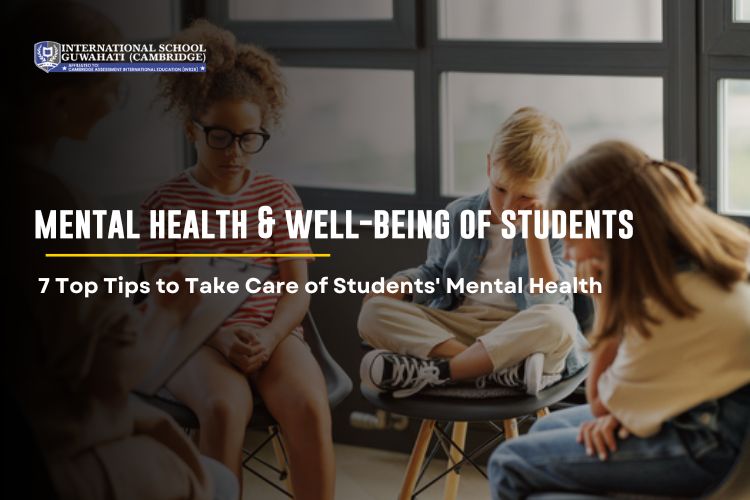![]()
As per a study conducted in 2022, about 81% of students in India reported feeling anxious, panicky, and even depressed about their academics. This is a striking fact that exposes the untold reality of students’ lives. Therefore, it is important that we address the mental health and well-being of students in educational institutions as well as at home.
Today we have more challenges and burdens for students to carry than we did a few years ago. With the academic competition increasing, they are left with no option but to push their limits every day. This sounds healthy academically but mentally, it is adding a great deal of strain for the students to deal with.
Therefore, we need coping mechanisms for students to help them deal with this pressure. We must understand that the academic pressure will only ever increase but mental issues don’t have to.
How to Take Care of Students’ Mental Health and Well-Being?

Whether at home or in school, students’ mental health should be a priority. But, most schools fail to address this situation. Hence, here are a few proven and effective techniques to deal with mental health in schools.
Encourage Open Communications
What doesn’t come out of our minds makes a home in us in the form of sadness. Therefore, we must encourage open communication with students.
It is not an unknown thing that students come to school mainly to be with their peers. Their main motivation is friendship and a safe space to explore their abilities. Therefore, open communication can create a comfortable space for the students to share their thoughts and feelings.
Teachers can pose open-ended questions and have a dedicated one-to-one conversation session, role modelling, and non-verbal communication. This can promote active engagement and make them feel like they belong there. It will further help in enhancing the whole learning experience.
Teach Stress Management Skills

The world is spinning and stress may be the main force behind it. According to a recent study, a striking 63.5% of students in India reported feeling stressed due to their academics.
Stress affects students in the most adverse way possible. It not only ruptures the mental well-being of the students but also severely affects their physical health like weight loss, loss of appetite, and other issues.
To maintain the mental health of the students, the institution should organise regular mindfulness sessions such as meditation and breathing exercises. These stress management techniques offer a healthy outlet for emotions and thoughts that otherwise contribute to academic stress.
Promote School and Personal Life Balance
Academic pressure is increasing by the day. It is making it increasingly hard for students to find the balance between academics, school, and personal life. Today, the school also demands more in academics as well as extracurricular activities which is harder still for students to manage keeping their grades up. This is a major source of stress for students.
Therefore the school must undertake to educate the children about maintaining a balance between personal life and academics. Strategies like setting boundaries, prioritising tasks, and taking regular breaks can work like a dream for students.
At the end of the day, students’ overall mental health and well-being must be prioritised.
Also Read: 4 Ways to Achieve School and Life Balance
Provide Access to Support Services

To tackle anxiety, stress, and depression in students, the school should undertake support services. Counselling on and off campus can be arranged to make the students feel they have professionals to talk to.
Arranging help for students can be an effective way to get them to talk and open up. And we all know, when one can talk about it, it becomes easier to deal with.
Foster a Sense of Belonging
Students establish a sense of social belonging when they can connect with their peers and teachers. This is a crucial element of their mental health and well-being.
Hence, institutions should inculcate a welcoming environment where students can feel safe. Clubs, groups, and activities should be included in the school or college curriculum to promote healthy environments. This can help them connect with like-minded peers and make them feel comfortable in the school setting.
Encourage Healthy Lifestyle Changes
A healthy lifestyle promotes healthy academics and the overall health of the student. We have to understand that a healthy lifestyle does not mean a high-maintenance living. It can be as simple as eating healthy, regular exercising, and getting a good night’s sleep.
It is surprising how a simple lifestyle change can pivot our lives and the way we approach things. Hence, teachers and parents can encourage growing students to take up yoga and exercise, healthy eating, and other healthy lifestyle options.
Raise Awareness and Reduce Stigma

The most effective and important step to taking care of the mental health and well-being of the students in school and at home is to reduce the stigma around it. We always feel having anxiety and depression is somewhat of a stigma. Therefore, we can raise awareness and reduce the stigma so that students and people, in general, can talk about it without any hesitation.
Teachers can facilitate this by organising decision-making workshops, adolescence education programs, mental health awareness week, and other similar events and programs to help students come to terms with their thoughts and emotions.
Bottom Line
Ultimately, the mental well-being of students goes hand in hand with their overall growth and development. By investing in their emotional health, we are not only nurturing future leaders and innovators but also contributing to a healthier, happier, and more compassionate society as a whole.
Also Read: How to Boost Self Improvement in Students?










